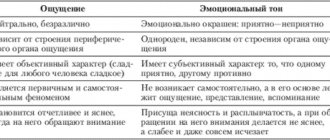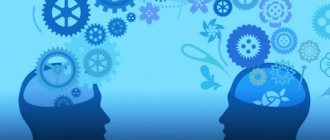Our intelligence manifests itself in different ways. For example, some quickly grasp new material when learning. Others quickly adapt to changes and easily find solutions in unusual situations.
Some experts attribute intelligence to high IQ, creativity, creativity, in the end. Unfortunately, a person often lives in conditions that can provoke a decrease in intelligence upon reaching a certain development threshold. It is different for everyone and depends on external (environment, influence of loved ones, climate, state of society) and internal factors (physiology, sleep and nutrition patterns, heredity). Do not confuse intelligence with any one manifestation of intelligence (memory, speed of thinking, ability to do quick mathematical calculations in the mind). Often those who are able to multiply five-digit numbers are completely lost when solving children's riddles or cannot guess the simplest rebus.
What is intelligence?
Intelligence allows you to quickly find a way out of difficult situations. It allows you to look for non-standard solutions and win in seemingly losing situations. Cognitive psychologists have found that this ability is inherent in nature, but can equally be developed or lost over time. With the help of the BrainApps service you can keep your mental abilities in good shape. You will be able to choose a convenient format for self-development, including solving non-standard problems.
In today's business environment, creativity and the ability to think outside the box are valued. There are special tests to identify character traits, emotional intelligence, and other capabilities in order to effectively use them in the company’s activities. What can you do to learn to be smart and use your brain 100%?
When logical thinking begins
Only a few people think logically. Most of us are biased, prejudiced, infected with preconceptions, jealousy, suspicion, fear, pride and envy. © Dale Carnegie
A person is not born immediately with certain inclinations to successfully draw correct conclusions and build logical structures. Human logical thinking is not an innate, but an acquired property. Even the basic type of figurative thinking appears in children at 1.5 years old. The ability to think abstractly appears much later - at primary school age, at approximately 7-8 years. Logic develops gradually with the development of the personality itself. However, regular training and exercises will only give positive results in the development of logical thinking.
The main type of development of preschool children is precisely logical tasks and exercises. Since it is logical thinking that will help a child achieve success in the future by using his intellect. Development occurs in a playful way, according to the age characteristics of children. Logic lessons are included in both the kindergarten and school curriculum. However, parents should not neglect independent studies at home. After all, by developing logical thinking, you improve your child’s intellectual skills.
Is it possible for an adult to improve and improve his logical thinking? Of course, this is possible and even necessary, because in the modern world everything is subject to very rapid changes, the knowledge acquired at school and university gradually becomes outdated, and there is a need to update information. Developing the ability to build logical conclusions for an adult can be a very enjoyable process, since, as in the case of children, it can take place in a playful way. If you are an eternal student or a typical pedant, then you can draw up a detailed plan for serious exercises. However, it will be much more interesting to get together with friends and play logic games. Information obtained in this way will settle more reliably in the mind and be fixed in a person’s memory than dry memorization of rules and solving boring problems.
Food for the brain
Oddly enough, the human brain is extremely voracious. It consumes a huge amount of energy. Low-fat protein foods rich in vitamins C, A, B and E are considered beneficial for the brain. It is important to start the day with a hearty, nutritious breakfast. But many are mistaken in thinking that the brain sleeps at night. At this time of day, several cycles of its activity go through. Undoubtedly, by morning our thinking apparatus has a certain degree of exhaustion and requires replenishment. A glass of freshly squeezed juice, scrambled eggs and toast will help you feel a surge of energy in the morning and set your brain up for productive work.
Examples of ingenuity
The area where ingenuity is most often demonstrated is study. An excellent example is a student who was able to easily smuggle a cheat sheet into an exam, where there was very strict control over this, and pockets were checked. You could only bring a pen and a bottle of water, which one student took advantage of. He printed out all the important formulas in the same font as all the information on the bottle - country of production, composition, legal information, etc. Instead, he pasted in text with formulas so that it was indistinguishable from what was written on the bottle. No one noticed this and the student easily used the cheat sheet.
Ingenuity also manifests itself in everyday life. As an example, we can cite the story of a mother who, having 2 small children, constantly did not get enough sleep, because... The children constantly demanded attention and made noise. One afternoon, when her strength was running low and she wanted to sleep, and the children continued to make noise, she decided to be smart and use a trick. She told the children that she would go to bed to rest and asked them to wake her up in 15 minutes and they would start cleaning the apartment. After that, silence reigned, the children hid in their rooms and did not make the slightest sound.
Another example of ingenuity is the ability to open a bottle of wine without a corkscrew. It would seem that the task is not easy, but ingenuity helps to use available means for this. For example, you can use a regular writing pen for this, pushing the cork inside the bottle, which will help pour the drink without problems.
Sleep and its importance for health
Just a simple lack of sleep can lower IQ test scores by 10-20 points. This means that on average, without a couple of hours of sleep, you lose more than 20% of your productivity. And after a sleepless night, it’s hard to solve even simple problems, not to mention creativity, creative thinking and quick wits.
If the day has been stressful, the level of cortisol in our body rises sharply. This hormone destroys brain cells, but is effectively eliminated during sleep. Constant lack of sleep can lead to migraines, body weakness, and constant fatigue.
Ways to develop logical thinking
If you are determined to take up pumping your brain, then the first thing you need to do is eradicate your laziness and start looking for suitable methods and tasks. There are a huge number of ways to train your thinking. Let's look at some of them in more detail:
- Board games . Couples and for a large group of friends, serious and humorous - the choice is huge, you just need to determine which type is more interesting to you. The most popular board games for developing human logical thinking include:
- Chess;
- Checkers;
- Backgammon;
- "Monopoly" ("Big Business");
- “Scrabble” (“Scrabble”, “Bulda”);
- Card games (“Munchkin”, “Uno”).
- Logic problems . When searching for and selecting logical problems, use books or the Internet, which is full of various examples and thematic collections. Start with the easiest level, gradually increasing the load, moving towards the highest level of difficulty. If you don’t know the answer, don’t hesitate to peek, because knowing the source data will help you understand the solution and the construction of a logical chain. This type of task includes:
- Puzzles;
- Graphic puzzles;
- Word problems;
- Puzzles;
- Anagrams;
- Puzzles;
- Rubik's Cube;
- Solitaire games (“Mahjong”, types of card layouts).
Example of a logical problem : Seven sisters spend their leisure time together. The first one plays chess. The second one is reading. The third one is cleaning. The fourth one is watering the flowers. The fifth one is playing with the cat. The sixth one is embroidering. What does the seventh sister do? Correct answer: The seventh sister plays chess with the first.
- Test tasks for intelligence . There are many online tests based on the principle of cause and effect. Most often these are games of the “Find the odd one out” type.
- Puzzles, crosswords, scanwords, chainwords, etc. Particularly difficult are the digital types - Japanese crosswords and Sudoku. Also, an excellent task for developing the ability to think logically would be to independently compose a crossword puzzle.
- Mastering deductive and inductive methods . Deduction is logic in its purest form. In 99.99% of cases, the deductive method gives the correct answer to the problem. In everyday life, induction is more often used - reasoning based on facts that have a certain percentage of falsity. In simpler terms, inductive reasoning begins with particular conclusions and seeks confirmation in general concepts. The deductive method, on the contrary, originates from the external world, and the conclusion is already presented in the form of individual conclusions.
Example of a deductive method : Winter has come and that’s why it’s snowing outside.
Example of the inductive method : It snowed outside, therefore winter has come.
Interesting games, simulators, tests
Intelligence can and should be trained. The BrainApps service has prepared a powerful tool for you - a personal account that clearly demonstrates the progress of the development of your abilities. How it works? By regularly exercising according to your chosen program, you improve the interaction between different parts of the brain. By completing tasks and exercises, you improve your thinking abilities. In addition, you learn to interact more effectively with memory, both short-term and long-term. Your self-development should be based on personal feelings, abilities, aspirations and goals.
The essence of the concept of “logical thinking”
Logic is not identical to knowledge, although its area coincides with the area of knowledge. Logic is the general connoisseur and judge of all particular studies. It does not set out to find evidence; it only determines whether evidence has been found or not.
Logic does not observe, does not invent, does not discover - it judges. So, logic is the science of the functions of the mind that serve to evaluate evidence; it is a teaching both about the process of transition from known truths to unknown ones, and about all other mental actions, insofar as they help this process. © John Stuart Mill
To begin with, let us examine separately the two components of the concept of logical thinking - logic and human thinking.
What is logic? Translated from Greek, logic is called “the science of true thinking” and “the ability to reason.” In the generally accepted sense, logic is the science of the methods and laws of human intellectual activity. Logic is the study of methods for achieving truth using experience and knowledge gained previously.
Thinking is considered to be a mental process during which previously received information is processed and interdisciplinary connections are established. Thanks to objectivity and correct thinking, a person has the opportunity to get an idea of the true state of things.
Taken together, we get a definition of what human logical thinking is. This is a thought process during which logic is used and logical constructs are applied. The goal of this type of thinking is to arrive at valid, objective conclusions based on available information.
How to become more attentive?
It is possible and necessary to develop mindfulness. We offer some tips that will tell you how to become more attentive.
Watch
Develop this quality in yourself. Observation and mindfulness are closely related to each other. Pay attention to details, do not miss important little things, observe what previously seemed meaningless or uninteresting to you.
Be curious
How to be attentive? Advice from psychologists: learn from children. Remember how in childhood we were interested in literally everything - down to the smallest insect on a branch. As we become adults, we lose this need to know. Sometimes it's because you're busy. Some people think that they already know everything they need to live. But it is not so. Even the ancient thinker Socrates said: “I know that I know nothing.”
People can explore the world every day. Show curiosity in the area that interests you, learn new things from literature, films, and TV shows. Deepen your knowledge in your profession, improve your hobby, studying its subtleties down to the smallest detail, numbers, and details.
Learn to switch
The monotonous performance of the same task, even a very interesting and exciting one, can get boring. Boredom will cause drowsiness, followed by decreased concentration. As soon as you feel anything like this, immediately switch to another job. By wisely allocating time to complete tasks, organizing their implementation according to the degree of importance, leaving time for proper rest and sleep, you will increase the efficiency of your work and the question: how to become more attentive will cease to exist for you.
Bring mindfulness to automaticity
How to be attentive all the time? Very simple. Repeat the same action until it becomes automatic. For example, you set yourself the task of finding errors in accounting reports. Start not just looking at bills, but carefully checking them. Practice both on your own documents and on others. The skill of carefully analyzing information will be developed over time, and you will easily notice errors and shortcomings that you previously overlooked.
Get rid of the silence
Oddly enough, silence prevents you from doing your work carefully. “How to be attentive if there is noise and commotion around?” - you ask. Nothing complicated. Just turn on some nice background music. Not only will it not be distracting, but it will create a good atmosphere for work. And this fact has been proven by scientists.
Psychologists give another answer to the question: “How to become attentive?” In their opinion, they need to walk more often and go on picnics. Fresh air and nature improve mood, have a positive effect on a person’s emotional and physical health and, as a result, improve concentration and attentiveness.
Human logical thinking: why you need to develop logic
Perhaps some people believe that it is not at all necessary to develop logical thinking; you can do just fine without using logical connections. Such judgments are fundamentally wrong. After all, logical thinking and human activity are inextricably linked. Even in everyday life, you should have the skills to build objective chains. For example, in ancient times people were able to save lives thanks to logic and observations - if their fellow tribesman ate a berry and died, then it is quite logical that others should not eat these berries. Or, for the first gardeners and farmers, such skills were useful in order to know that if, for example, you plant a cherry pit, then, logically, a cherry will grow from it and nothing else.
We will not consider the benefits of constructing mental structures for managers or representatives of technical professions. Even an ordinary janitor understands that sweeping dust against the wind is absolutely illogical. Or the painter, using logical connections, will not begin painting the floor from door to wall.
Therefore, a person’s logical thinking plays an important role in building a successful career; logic is the key to normalizing communication between people, the ability to defend and argue one’s opinion, as well as to realize the truth and objectivity of everything that happens.
Topics: Personal growth, Intelligence development










